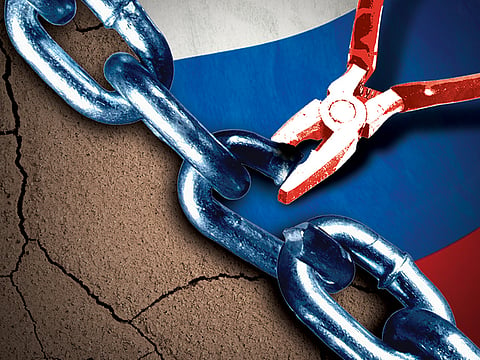What Russia gains from meddling in western politics
The West has yet to show it has a plan to counteract the solvents that the Russians have injected into its democratic processes

From the Brexit referendum to the American and French presidential elections, Russia has been causing serious mischief in the western democracies. Recently it emerged that hundreds of fake Twitter accounts, believed to be linked to the Kremlin, had been used to influence British politics. The pattern is too uniform and widespread to be an accident. So what’s going on?
Russian leaders have taken a cool look at the world and decided that they have nothing to lose. In their eyes, the West has consistently sought to humble Russia. In June, Russian President Vladimir Putin described the economic sanctions in place since the Crimean annexation of 2014 as merely the latest phase in the West’s aggressive activity, going back to the Soviet decades and even to the days of the Tsars. Trouble, he declared, comes in a rush whenever “Russia has begun to stand on its own feet”. He is not the only one to think this way. His close associates voice still more rancid variations on Russian victimhood. Sergei Naryshkin, director of the Foreign Intelligence Service, argues that the sanctions are not only punitive but illegal. Security Council secretary Nikolai Patrushev accuses the West of taking control of Chechnya in the 1990s and having the ultimate ambition of breaking up the Russian Federation.
These ideas are born out of resentment at Russia’s tumble down the slopes from superpowerdom. Less unhinged are the complaints about how the Nato countries behaved in the years of Russian frailty. Russian ministers continually dwell on the West’s aerial bombardment of Belgrade in 1999 and its subsequent recognition of the breakaway state of Kosovo. Russia accepts that it is no longer a world power but asks, if the Americans can meddle violently in European affairs, why can’t the Russians?
Except that Putin never admits to meddling.
It is doubtful that the Russian authorities in 2016 genuinely banked on getting Donald Trump elected as the President of the United States. But the disruption and discrediting of American politics were definite objectives. The Russians succeeded too well for their own good. The role they played in helping Trump’s ascent to power was so sensational that members of both Republican and Democratic parties have found common cause in looking for signs of treachery by Putin’s best friend Trump.
Although the American campaign might have been a foray too far, the offensives in Europe have achieved much that the Kremlin desired. In 2014, Russian finance made a friend of Viktor Orban in Hungary with a generous long-term loan to build a nuclear power station. Orban stood by Putin’s side in Moscow to celebrate the contract, and Putin could take satisfaction from the success in weaning a European leader off the breast of European Union (EU) unity.
Putin already counted Italy’s Silvio Berlusconi among his boon companions, a friendship interrupted only by the Italian premier’s fall from grace in 2013. But prime ministers are not the Russian’s only quarries. The aim of dissolving Europe’s already shaky concord was pursued this year by assisting Marine Le Pen’s presidential bid after French banks refused to lend their money to the Front National. Le Pen didn’t win, but her loud protests against both the EU and its treatment of Russia would have made any financial assistance by the Kremlin worthwhile.
Stories have grown in credibility that Russian funding also helped the Brexit side in the 2016 United Kingdom referendum. Though the government of Prime Minister Theresa has ignored Labour member of parliament Ben Bradshaw’s demand for a public inquiry, May’s speech at London’s Guildhall last Monday included a general rebuke about Russia’s persistent political meddling.
If recent Russian opinion polls are anything to go by, Putin will gain from being censured by foreigners. There’s a directness about him that many Russians revere. What he has, he intends to hold, and that includes Crimea. What he hasn’t got, however, is a vibrant economy. His long years in the highest offices of state have been wasted on armaments and wars, instead of being devoted to achieving the overdue diversification of the Russian economy.
Putin has come to view world politics as a zero-sum contest. He delights in seeing the EU crippled by internal disagreements. He takes equal pleasure in what he claims to be the unity of Russian public life. Rejecting international criticism of his authoritarianism, he depicts the Russian people as content with the benefits he has brought them.
With or without Brexit, he is probing weak spots in Europe on the basic principle of making them weaker. He no longer makes a secret of what he is up to. A month ago, he spoke openly about the need for “creative destruction” as his prerequisite for the building of a new world order. Destroying the links that bind and strengthen Europe’s many nations individually and collectively is the Kremlin’s tried-and-tested strategy. The Russian leadership seeks to do what it accuses the Americans of wanting to do in Russia. The West has yet to show it has a plan to counteract the solvents that the Russians have injected into its democratic processes.
— Guardian News & Media Ltd
Robert Service is a senior columnist. His book, The Last of the Tsars: Nicholas II and the Russian Revolution, is published by Macmillan.
Sign up for the Daily Briefing
Get the latest news and updates straight to your inbox



